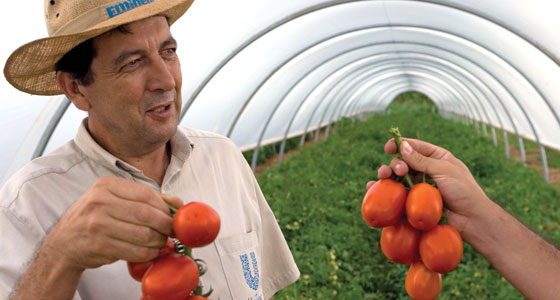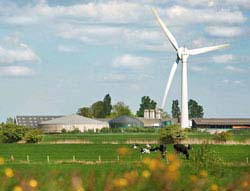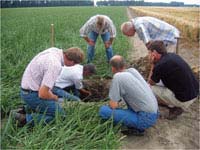Sustainable Agricultural Sourcing Takes Root
SAI Platform provides farmers and food companies with practical guidance for the procurement of raw materials in ways that are environmentally, socially, and economically responsible.

The need for increased food production is well documented. With the demands of a growing population, food production must rise by 70% by 2050 to feed nine billion people. Sourcing the right quantities of good quality and safe agricultural raw materials is not something that can be taken for granted. Serious challenges—including social (labour conditions, gender inequality, and aging farmers), environmental (climate change, biodiversity, and soil and water limitations), and economic—have changed the equation for procurement managers, and many food and beverage companies have decided to include sustainable sourcing in their corporate strategies.
Sustainable sourcing of agricultural raw materials refers to the procurement of raw materials in a way that is observant of environmental, social, and economic well-being. As food and beverage companies place demands on the supply of raw materials, they are indirectly placing a demand on the environment and the rural communities. When done sustainably, this demand does not perturb the ecosystems and social landscapes at large; moreover, there is potential for enhancing environmental services and rural livelihoods.
The challenge, therefore, is to act in a way that protects the earth’s resources and strengthens the livelihoods of farmers and their communities. From a commercial perspective, SAI Platform, the global initiative helping food and drink companies to achieve sustainable production and sourcing of agricultural raw materials, has played a critical role in advancing sustainable agriculture worldwide by bringing members together to share knowledge and initiatives that support the implementation of sustainable agricultural practices. Through collaboration with millions of farmers around the world, these global SAI Platform members have the potential to influence farming practices in every agricultural producing country.
However, after a commitment to sustainable sourcing has been made at a strategic level, how can companies work with their supply chains to make this a reality? Working with farmers who are critical stakeholders in achieving sustainable sourcing plays a vital role.
Supporting Farmers Through Alignment
A fundamental way to support farmers to achieve sustainable agriculture practices is to have a common definition of what qualifies as sustainable agriculture.
The definition agreed upon by SAI Platform’s members is this: “Sustainable agriculture is the efficient production of safe, high quality agricultural products, in a way that protects and improves the natural environment, the social and economic conditions of farmers, their employees, and local communities, and safeguards the health and welfare of all farmed species.”
Drawing from key existing internal and external standards, SAI Platform elaborated a very complete set of Principles and Practices (P&Ps) along the economic, social, and environmental pillars of sustainability. This was done for arable and vegetable crops, coffee, dairy, fruit, and beef. The P&Ps were tested on the ground through various companies’ pilot projects and programs, and improved. The P&Ps are revised periodically to reflect current better practices in sustainable agriculture.
Many companies thereafter fully adopted these joint P&Ps or drew from them to elaborate or revise their own internal codes. Several firms reported that it was easier to ask their suppliers and the producers at the start of the value chain to comply with requirements that are similar to those of other buyers, rather than asking them to comply with a multitude of different codes.
But member companies quickly felt the need to do more than align standards. Together, they chose to create other tools designed to help farmers implement the standards. A series of technical and practical tools were developed, such as an agriculture standards benchmark study, a water impact calculator, and a financial tool on farm sustainability.
More recently, two specific tools were developed by the platform members in order to help farmers assess their level of implementation of the P&Ps, and the sustainability impacts of such implementation: A farmer self-assessment allows farmers to assess their practices against the P&Ps, and Sustainability Performance Assessment (SPA) guidelines help them to measure the real impacts of practices on the sustainability of a farm.
“Being the largest organization of its nature, SAI Platform has been an influential force in embedding sustainable agriculture in the food and beverage industry globally,” said Ernesto Brovelli, President of SAI Platform and Senior Manager, Sustainable Agriculture, The Coca-Cola Co. From the initial phases of product development and ingredient selection, to informing customers on issues related to sustainable agriculture, SAI Platform provides thought leadership and rallies for action.”
Here is a look at three different approaches to advancing the pursuit of sustainable sourcing from SAI Platform member companies.
--- PAGE BREAK ---
Unilever: Supporting Farmers Through Investment
Unilever, which is based in London, England, and Rotterdam, the Netherlands, and is a founding member of SAI Platform, has found that a significant way to support farmers in achieving sustainable agriculture practices is through investment.
Unilever’s Knorr brand has set up the Knorr Sustainability Partnership Fund. The aim is to invest €1 million in knowledge development and equipment in order to enable suppliers to build the capability with their growers to implement sustainable agriculture solutions that they may not be able to tackle alone. Knorr invests 50% of any agreed project budget, matched by an equivalent investment from the supplier or the grower.
According to Unilever, this enables the supplier to experiment with new ideas and accelerate implementation of sustainable agricultural practices. Unilever’s direct suppliers of agricultural materials make the application, but they can do so on behalf of a grower or group of growers working for that supplier. Evidence of an equivalent investment by the supplier or grower is required.
 The fund gives priority to projects that bring new knowledge to the industry, draw suppliers together to tackle an issue, are carried out in cooperation with credible universities/nongovernmental organizations, afford a positive return on investment for stakeholders, are relevant to consumers of Knorr products, and provide tangible stories, Unilever explains on its website.
The fund gives priority to projects that bring new knowledge to the industry, draw suppliers together to tackle an issue, are carried out in cooperation with credible universities/nongovernmental organizations, afford a positive return on investment for stakeholders, are relevant to consumers of Knorr products, and provide tangible stories, Unilever explains on its website.
According to Unilever, projects supported by the fund focus on progress in the following areas: farmer-led experiments for new knowledge; biodiversity projects within a landscape/area or group of suppliers in the area; efforts to ensure water resources are protected and sustainable within a landscape/area; and initiatives that phase out the most toxic pesticides. Any other project that helps suppliers to meet the criteria of the Unilever Sustainable Agriculture Code (SAC) is also considered an important area of focus.
Thanks to the Knorr Sustainability Partnership Fund, in September 2012, a new soup launched in France became the first Unilever product to promote an ingredient (tomatoes) as sustainably grown in accordance with the Unilever Sustainable Agriculture Code.
Unilever is now sourcing more than one-third of its agricultural raw materials sustainably, the company announced in April 2013, adding that is has made significant progress toward its target of 100% by 2020. At its current level of 36% of agricultural raw materials sourced sustainably, it has exceeded the interim milestone of 30% the company set for itself in 2010 when it launched the Unilever Sustainable Living Plan.
David Pendlington, Procurement Operations Director, Sustainable Sourcing, said, “What can be achieved at farm level by Unilever alone is limited. The cooperation of others in the food industry and wider stakeholders to make progress in sustainable agriculture is vital. Being a member of SAI platform links us to a wide range of stakeholders and competitors, and this presents us with a responsibility to lead through SAI platform and turn common ground into action. Unilever is actively grabbing this opportunity.”
FrieslandCampina: Supporting Farmers Through Knowledge and Training
SAI Platform member FrieslandCampina, a manufacturer and supplier of dairy products based in Amersfoort, the Netherlands, and fully owned by Zuivelcooperatie FrieslandCampina, has adopted a cooperative sustainability approach to set a credible standard for dairy farming so as to ensure responsible dairy farming both at the farm level and at the company’s processing level.
FrieslandCampina has set a number of ambitious goals to attain by 2020. These include reducing use of antibiotics to 1999 levels; maintaining current levels of outdoor grazing; complying with legislation for manure phosphates and preventing new legislation; achieving 30% reduction of greenhouse gases between 1990 and 2020; reducing animal health issues to natural levels; achieving 100% responsible soy in cattle feed by 2015; and recognizing the role of the farmer in management/maintenance of the landscape.
FrieslandCampina has implemented measures to attain each objective, but the most important was getting its member dairy farmers on board. This meant adopting an inclusive approach by stimulating and facilitating individual learning and training of the farmers using tools, workshops, “train the trainer” sessions, and collaborations (for example, with vets and feed suppliers), while monitoring and measuring the practical use and cost-effectiveness of results. To stimulate innovation, the dairy farmers needed to develop their knowledge and to learn from each other. They also needed tools to support sustainability at the farm level and to measure the results. A farmer’s intranet was created, enabling a knowledge-sharing and feedback process. Agreement was also reached on measuring and monitoring of objectives with a standard approach allowing comparisons and comprehensive data collection and giving credibility to the process. Standards were set up for every dairy company, and implementation started in 2012.
FrieslandCampina’s activities have not only increased the accountability of the firm, but also benefitted the entire Dutch dairy sector. Today, the sector’s objective is to set the standard for sustainable dairy farming.
--- PAGE BREAK ---
 Heineken Skylark Project: Supporting Farmers Through Partnerships
Heineken Skylark Project: Supporting Farmers Through Partnerships
Heineken began an exploration of sustainable barley cultivation early in the millennium, teaming up with Agrarische Unie (a Dutch supplier of seeds, pesticides, and fertilizers), the company states in one of its sustainability reports and within a case study that appears on its website. When the project started in 2002, 10 farmers set out to define sustainability, arriving at the conclusion that a sustainability initiative should not be limited to one crop, but instead should address a complete rotation plan for arable crops.
Fifty new growers joined the project as “Friends in Rotation” in 2006, and they became members of the Skylark Association.Other participants, in addition to Heineken, included Cargill, CSM, Gebroeders Van Liere, Suikerunie, McCain, and Unilever.
The Skylark approach is collaborative, with participants sharing within their areas of expertise. According to the Heineken report, examples of such skill sharing range from defining objectives and setting goals to providing advice on agricultural topics such as soil fertility, fertilization, and crop protection.
“This is the best project I have ever worked on,” Louis Nannes of Agrarische said in comments that appear in the sustainability report. “Sustainable cultivation ultimately provides the best returns, and our members understand this.”
Piet Van Liere from Gebroeders Van Liere is also quoted. “It’s extraordinary that Heineken has taken the initiative in promoting sustainable cultivation from the grass roots up,” he stated.
The Skylark Foundation now works with 367 farmers in 35 region groups and has 25 supply chain partners, 13 donors, and 10 agricultural and business advisory organizations. “Sustainability is connecting people with an open mind,” said Henk Heinhuis, Director of Skylark Foundation.
“This is a great example of where farmers are deciding to farm sustainably and, with the help of the supply chain partners, are producing sustainably sourced products,” said Haaye Boonstra, Sustainable Sourcing Development Manager, Brewing Solutions. “It’s a win-win situation for the complete supply chain—from farmer to consumer.”
Boonstra said that Heineken adopted SAI Platform’s Principles and Practices for Sustainable Agriculture in 2011. “We respect and recognize local practices or sector standards as standards for sustainable development,” he observed. “These schemes will be benchmarked through independent audits using SAI Platform Principles and Practices/Farmer Self-Assessment as the reference.” Last year, Boonstra said, the procedure was applied within Skylark, and Skylark farmers are supplying Heineken with sustainably sourced barley.
What Is SAI Platform?
SAI Platform is a global initiative helping food and drink companies to achieve sustainable production and sourcing of agricultural raw materials. The organization brings together members who share, at precompetitive level, knowledge and initiatives to support the implementation of sustainable agriculture practices.
There are over 50 global members which, through collaboration with millions of farmers around the world, have the potential to influence farming practices in every agricultural producing country.
SAI Platform was created in 2002 by food and drink companies sharing a common concern about the undervalued and critical state of global agriculture. Today, the mission is to provide business support to enable members to forge the way to sustainable agriculture.
Working with several partners, SAI Platform has developed a sustainable sourcing guide, which can be downloaded at the organization’s website. For more information, visit www.saiplatform.org, or contact [email protected].
Practical Guidance
Sustainable Sourcing of Raw Materials: A Practitioner’s Guide is the result of collaboration between the Sustainable Agriculture Initiative (SAI) Platform, the CSL learning platform of International Institute for Management Development Global Center for Sustainability Leadership (IMDCSL), the International Trade Centre (ITC), and the Sustainable Trade Initiative (IDH). Supporters are Business Social Responsibility (BSR), the Sedex Information Exchange (Sedex), and the Sustainable Food Laboratory (SFL).
To download the full guide, visit www.saiplatform.org.
Peter Erik Ywema is General Manager,
SAI Platform, Brussels, Belgium
([email protected]).
